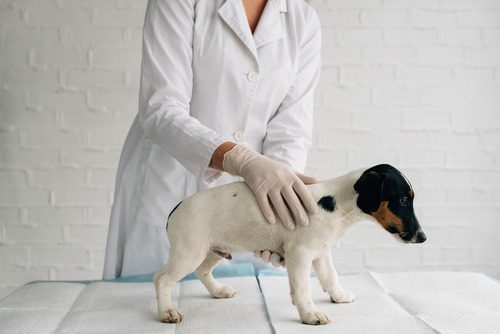Do Ticks Hurt Dogs?

Ticks are small parasites that can cause big problems for dogs. They latch onto the skin, feed on blood, and may transmit harmful diseases. Pet owners sometimes ask, “Do ticks hurt dogs?” While the immediate bite might seem minor, the risks that follow can be serious. This blog will help you understand how ticks affect dogs, what symptoms to watch for, and why prevention is so important will help you better protect your pet. If you have concerns about ticks or your dog’s health, call Bulverde Animal Hospital at (830) 438-7200 or request an appointment online.
What Happens When a Tick Bites a Dog?
When a tick attaches to a dog, it uses its mouthparts to pierce the skin and feed on blood. The bite itself can cause mild irritation, redness, or itching, but the real danger often comes from what the tick may be carrying. Ticks are known to transmit a variety of pathogens that can lead to serious illnesses in dogs. These include bacterial infections, parasites, and conditions that affect the immune system.
In addition to disease transmission, a heavy tick infestation can lead to blood loss and anemia, especially in puppies, small breeds, or dogs with other health concerns. So, when asking if ticks hurt dogs, the answer is yes. They can harm dogs both directly through bites and indirectly through disease spread.
Do Ticks Hurt Dogs Through Disease Transmission?
Yes, one of the biggest risks ticks pose to dogs is the transmission of disease. A single bite can expose a pet to dangerous conditions that may not show symptoms right away.
Common Tick-Borne Diseases in Dogs
- Lyme Disease – Caused by the bacterium Borrelia burgdorferi, Lyme disease can lead to fever, joint pain, lameness, and lethargy.
- Ehrlichiosis – This condition may cause weight loss, swollen lymph nodes, bleeding disorders, and long-term immune system complications.
- Anaplasmosis – Dogs infected may experience joint pain, fever, and loss of appetite.
- Babesiosis – A tick-borne parasite that attacks red blood cells, sometimes leading to anemia or organ problems.
- Rocky Mountain Spotted Fever – Symptoms can include fever, muscle pain, and neurological issues.
These illnesses highlight why the answer to the question, “Do ticks hurt dogs?” is more than just a simple yes. They can cause lasting damage if not detected and managed appropriately by a veterinarian.
Visible Effects of Tick Bites on Dogs
Sometimes tick bites leave behind visible signs on your dog’s skin. Pet owners may notice a small bump, redness, or a scab where the tick was attached. In cases where ticks stay latched on for a long time, the skin can become swollen or infected.
Some dogs may scratch, lick, or chew at the site of a bite, which can cause additional irritation. In rare cases, ticks can even cause temporary paralysis when their saliva releases toxins that interfere with nerve function. Thankfully, this condition often resolves once the tick is removed, but it underscores why the question of whether ticks hurt dogs must be taken seriously.
How Dogs React to Tick Infestations
The number of ticks on a dog can greatly affect their comfort and health. A single tick may cause irritation, but multiple ticks can lead to more severe issues. Dogs with heavy infestations may become restless, weak, or fatigued from blood loss.
In addition to physical discomfort, some dogs show changes in behavior when infested with ticks. They may become less active, lose interest in food, or show signs of pain in their joints if a tick-borne illness develops. The overall impact makes it clear that ticks do more than just cause itchy bites.
Where Dogs Pick Up Ticks
Ticks are found in grassy, wooded, and brush-filled areas, making outdoor activities a common risk factor. Dogs that go hiking, camping, or even play in tall grass near home are at higher risk of encountering ticks. In Texas, ticks are active for much of the year due to the warm climate, which increases the chances of exposure.
Because of this, pet owners might ask, “Do ticks hurt dogs more in certain areas?” The answer is yes, regions with higher tick populations and longer warm seasons present more risk. Understanding where ticks live helps pet owners take preventive measures before problems arise.
Preventing Tick Problems in Dogs
Prevention is one of the best ways to protect dogs from the harm ticks can cause. While ticks can bite any dog, there are steps pet owners can take to lower the risk.
- Check your dog regularly – After walks or outdoor play, inspect your dog’s coat, especially around the ears, neck, armpits, and between toes.
- Maintain your yard – Keep grass trimmed and remove leaf litter where ticks like to hide.
- Be mindful of outdoor activities – Stick to clear paths during hikes instead of tall grasses or dense brush.
- Schedule veterinary visits – Routine exams allow your veterinarian to check for tick-related concerns and provide guidance tailored to your dog.
The more proactive pet owners are, the less likely they are to face the stressful question of whether ticks hurt dogs through infestation or disease.
When to Contact Your Veterinarian
If you notice a tick on your dog, or if your pet starts showing unusual symptoms such as fatigue, loss of appetite, or unexplained lameness, it’s important to contact your veterinarian. Tick-borne diseases may not appear right away, so professional evaluation is key to protecting your dog’s health. Veterinarians can also recommend year-round protection that fits your pet’s lifestyle and risk level. This is especially important in regions like Bulverde, TX, where ticks remain active for much of the year.
Protecting Your Dog from Tick Dangers
So, do ticks hurt dogs? Absolutely. From itchy bites to serious diseases, ticks can affect your dog in many harmful ways. Recognizing the risks, watching for symptoms, and working with your veterinarian are the best ways to protect your pet. For more information about tick prevention or to schedule an appointment, call Bulverde Animal Hospital at (830) 438-7200 or request an appointment online.
Recent Posts
About Us
At Bulverde Animal Hospital, our ultimate goals are excellent service to clients, personal growth, and the professional development of our staff. We are a small clinic creating a significant impact on pets' lives.
